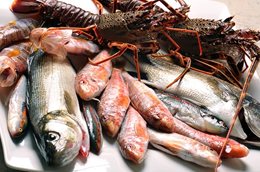
Iceland roared into the world's consciousness in 2010 when the eruption of the active volcano Eyjafjallajökull brought global travel to a standstill. A few years later, however, Iceland took its rightful place as a premier travel destination as more and more travelers experienced all that the isolated island nation has to offer: the thundering waters of the mighty Gullfoss waterfall, the foundation narrative of the Icelandic sagas, which permeates the national consciousness, the soothing waters of the Blue Lagoon, the lunar landscape lava fields of the country's north, the verdant fields full of sheep and Icelandic ponies, and the active glaciers along the Golden Circle. It is Iceland's cuisine, however, that is fast developing into the country's best calling card.
Iceland's maritime position anchors fish and seafood in a prominent position on most menus, thanks to the dynamic fishing industry as well as newer introductions such as mussel farming. For high-end restaurants such as the impossibly-exclusive
DILL to the more mainstream, but no less delicious
Fish Company and the outstanding fish and chip shops along Reykjavik's wharf, to say nothing of the capital's infamous lobster food truck, exquisitely fresh fish chowder, arctic char, and Iceland's signature smoked fish are culinary highlights. But fish is only the beginning of the culinary treasures of Iceland.
Iceland's abundant sheep, lamb, and cattle spend the spring and summer free-range grazing which gives their meat a tangy, slightly salty and very organic taste. Reindeer are abundant in the region and smoked and grilled meat is popular fare at restaurants such as Reykjavik's
Grillmarket and
Apotheke. The cattle, sheep and goats also provide delicious dairy products, such as the region's renewed skyr and delicious cottage cheese and butter. Icelandic salt, flavored with licorice, arctic thyme, and rhubarb is used extensively in both curing and flavoring.
While Iceland is not known for abundant vegetables, berries are omnipresent in the country's cuisine, as is rhubarb; both are often paired with meat and dairy in very original flavor combinations such as those found in the Saga Museum's cafe
Matur og Drykkur, which gets my vote as Reykjavik's best restaurant.
Icelanders are beginning to produce craft beer and experimenting with infused aquavit, the strong liquor that has traditionally been the nation's favorite tipple. But the beverage Icelanders cannot live without is imported: coffee, which they take very strong and drink from morning until night.
Alexander + Roberts offer itineraries to Iceland to suit every palette. Enquire about our
Adventures Across Iceland, small group itinerary.